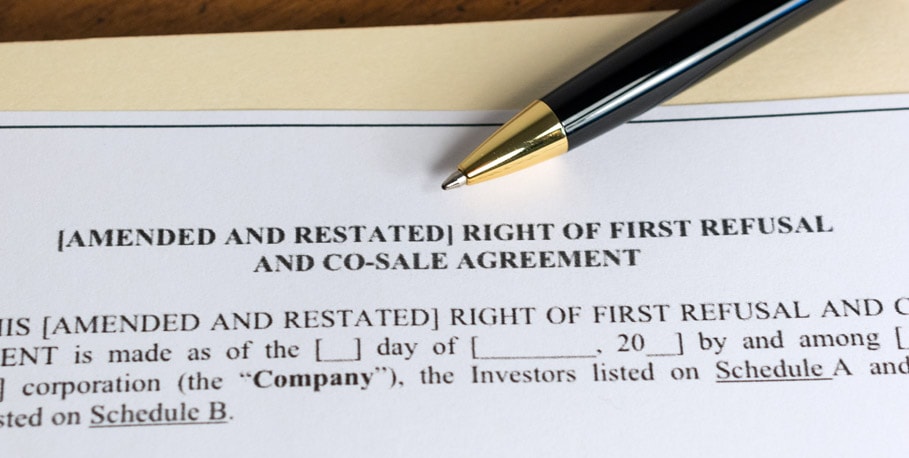Right of First Refusal and Co-Sale Agreement
Right of first refusal and co-sale agreement or ROFR for short, involves an agreement or clause that mandates a party provides notice before a transaction. Additionally, this agreement requires that an option is provided for the other party to refuse this transaction. In short, a right of first refusal ensures that someone is informed of an impending sale rather than being informed after the fact.
This provision is generally written in a contract and is common for transactions that involve the sale of a business, purchasing of business assets, commercial real estate sales, stock purchases, etc.
At Hoeg Law, we assist entrepreneurs and businesses with writing, negotiating, or providing general guidance in matters related to right of first refusal and co-sale provisions.
What Is Right of First Refusal?
A right of first refusal is an agreement between the owner of a property or another asset type and the holder. ROFR agreements can be made in regard to buying shares, buying a business, and many other transactions. The most common use of ROFR agreements, however, is for the buying and selling of commercial property.
A ROFR contract for commercial real estate gives the bearer the first right to purchase should the property be put up for sale.
For example, if you are leasing commercial premises, and the landlord forms a ROFR agreement with you, when the time comes that they wish to sell the property, they have to give you the first option on the sale.
If you do not wish to purchase the property, or are unable to, you are not bound to the transaction in any way. However, if you do wish to purchase, the owner is not allowed to enter into negotiations with other buyers or increase the original asking price based on offers from outside parties.
ROFR agreements usually span a specified period, such as two years.

Selling Commercial Property
If you are renting a commercial property in a competitive market, it’s important to draft a right of first refusal (ROFR) provision.
Securing ROFR can ensure that you and your business are not left high and dry if your landlord decides to sell the premises you are renting. Having to move business premises can be incredibly disrupting, and can even spell the downfall of certain businesses.
Right of First Refusal For Shareholder Agreements
Another common application for a ROFR agreements involves shareholder agreements. An article published by Deal Law Wire describes the purpose of an ROFR for Shareholder’s Agreements. According to the article,
“A ROFR provides non-selling shareholders with the right to accept or refuse an offer by a selling shareholder after the selling shareholder has solicited an offer for their shares from a third-party buyer.” (Deal Law Wire, 2017, Shareholders’ agreements: right of first refusal versus right of first offer).”
The Benefits of Having Right to First Refusal
Entering into a ROFR with your landlord yields a couple of key advantages.
Firstly, your business’s premises will not be sold without you having the first option to buy them. Second, because property owners are not allowed to enter into negotiations with other interested parties, you may also be able to secure the property for a lower asking price than if you had to bid against other buyers.
Lastly, potential buyers are generally less attracted to properties where a ROFR is in place. This could postpone the owner selling the property (which is a good thing if you are not ready to buy yet).
Do Not Enter Into a ROFR Without Legal Assistance
If you have any questions or concerns about an ROFR agreement, it’s important to seek legal assistance as matters related to corporate law and contracts can be quite complex.
Our business law firm has experience with writing and negotiating these contracts between buyers and sellers of commercial assets as well as shareholders within a corporation.
